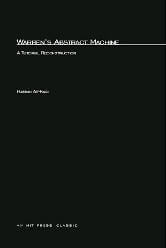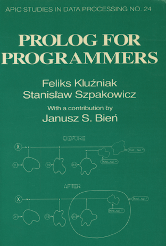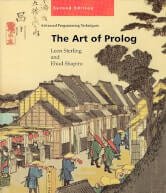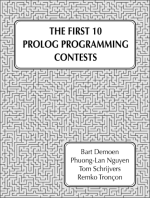Last Updated on December 25, 2024
9. Warren’s Abstract Machine: A Tutorial Reconstruction by Hassan Aït-Kaci
 This tutorial was, in an earlier version, a technical report of the Digital Equipment Corporation’s Paris Research Laboratory (PRL).
This tutorial was, in an earlier version, a technical report of the Digital Equipment Corporation’s Paris Research Laboratory (PRL).
In 1983, David H. D. Warren designed an abstract machine for the execution of Prolog consisting of a memory architecture and an instruction set. This design became known as the Warren Abstract Machine (WAM) and has become the de facto standard for implementing Prolog compilers.
This book is free for non-commercial purposes.
10. Prolog for Programmers by Feliks Kluźniak, Stanisław Szpakowicz & Janusz S. Bień
 Prolog for Programmers is intended as an introduction to Prolog for people familiar with conventional programming languages.
Prolog for Programmers is intended as an introduction to Prolog for people familiar with conventional programming languages.
It covers Prolog and logic, metamorphosis grammars, simple programming techniques, and a summary of syntax and built-in procedures. Later chapters cover the principles of Prolog implementation, an exercise, two case studies, and a discussion about Prolog dialects.
This book is licensed under a Creative Commons Attribution 3.0 Unported License.
11. The Art of Prolog, Second Edition by Leon S. Sterling and Ehud Y. Shapiro
 This book offers a departure from current books that focus on small programming examples requiring additional instruction in order to extend them to full programming projects.
This book offers a departure from current books that focus on small programming examples requiring additional instruction in order to extend them to full programming projects.
It shows how to design and organize moderate to large Prolog programs, providing a collection of eight programming projects, each with a particular application, and illustrating how a Prolog program was written to solve the application.
These range from a simple learning program to designing a database for molecular biology to natural language generation from plans and stream data analysis.
12. The First 10 Prolog Programming Contests by Bart Demoen, Phuong-Lan Nguyen, Tom Schrijvers, Remko Tronçon
 The first 10 Prolog Programming Contests took place in Ithaca (1994), Portland (1995), Bonn (1996), Leuven (1997), Manchester (1998), Las Cruces (1999), Paphos (2001), Copenhagen (2002), Mumbay (2003) and Saint-Malo (2004).
The first 10 Prolog Programming Contests took place in Ithaca (1994), Portland (1995), Bonn (1996), Leuven (1997), Manchester (1998), Las Cruces (1999), Paphos (2001), Copenhagen (2002), Mumbay (2003) and Saint-Malo (2004).
The contest organizers have written this book, containing the (slightly reworked) questions and an answer (in Prolog of course) for each question.
Next page: Page 4 – Prolog Techniques and more books
Pages in this article:
Page 1 – Simply Logical and more books
Page 2 – Adventure in Prolog and more books
Page 3 – Warren’s Abstract Machine: A Tutorial Reconstruction and more books
Page 4 – Prolog Techniques and more books
All books in this series:
| Free Programming Books | |
|---|---|
| Ada | ALGOL-like programming language, extended from Pascal and other languages |
| Agda | Dependently typed functional language based on intuitionistic Type Theory |
| Arduino | Inexpensive, flexible, open source microcontroller platform |
| Assembly | As close to writing machine code without writing in pure hexadecimal |
| Awk | Versatile language designed for pattern scanning and processing language |
| Bash | Shell and command language; popular both as a shell and a scripting language |
| BASIC | Beginner’s All-purpose Symbolic Instruction Code |
| C | General-purpose, procedural, portable, high-level language |
| C++ | General-purpose, portable, free-form, multi-paradigm language |
| C# | Combines the power and flexibility of C++ with the simplicity of Visual Basic |
| Clojure | Dialect of the Lisp programming language |
| ClojureScript | Compiler for Clojure that targets JavaScript |
| COBOL | Common Business-Oriented Language |
| CoffeeScript | Transcompiles into JavaScript inspired by Ruby, Python and Haskell |
| Coq | Dependently typed language similar to Agda, Idris, F* and others |
| Crystal | General-purpose, concurrent, multi-paradigm, object-oriented language |
| CSS | CSS (Cascading Style Sheets) specifies a web page’s appearance |
| D | General-purpose systems programming language with a C-like syntax |
| Dart | Client-optimized language for fast apps on multiple platforms |
| Dylan | Multi-paradigm language supporting functional and object-oriented coding |
| ECMAScript | Best known as the language embedded in web browsers |
| Eiffel | Object-oriented language designed by Bertrand Meyer |
| Elixir | Relatively new functional language running on the Erlang virtual machine |
| Erlang | General-purpose, concurrent, declarative, functional language |
| F# | Uses functional, imperative, and object-oriented programming methods |
| Factor | Dynamic stack-based programming language |
| Forth | Imperative stack-based programming language |
| Fortran | The first high-level language, using the first compiler |
| Go | Compiled, statically typed programming language |
| Groovy | Powerful, optionally typed and dynamic language |
| Haskell | Standardized, general-purpose, polymorphically, statically typed language |
| HTML | HyperText Markup Language |
| Icon | Wide variety of features for processing and presenting symbolic data |
| J | Array programming language based primarily on APL |
| Java | General-purpose, concurrent, class-based, object-oriented, high-level language |
| JavaScript | Interpreted, prototype-based, scripting language |
| Julia | High-level, high-performance language for technical computing |
| Kotlin | More modern version of Java |
| LabVIEW | Designed to enable domain experts to build power systems quickly |
| LaTeX | Professional document preparation system and document markup language |
| Lisp | Unique features - excellent to study programming constructs |
| Logo | Dialect of Lisp that features interactivity, modularity, extensibility |
| Lua | Designed as an embeddable scripting language |
| Markdown | Plain text formatting syntax designed to be easy-to-read and easy-to-write |
| Objective-C | Object-oriented language that adds Smalltalk-style messaging to C |
| OCaml | The main implementation of the Caml language |
| Pascal | Imperative and procedural language designed in the late 1960s |
| Perl | High-level, general-purpose, interpreted, scripting, dynamic language |
| PHP | PHP has been at the helm of the web for many years |
| PostScript | Interpreted, stack-based and Turing complete language |
| Prolog | A general purpose, declarative, logic programming language |
| PureScript | Small strongly, statically typed language compiling to JavaScript |
| Python | General-purpose, structured, powerful language |
| QML | Hierarchical declarative language for user interface layout - JSON-like syntax |
| R | De facto standard among statisticians and data analysts |
| Racket | General-purpose, object-oriented, multi-paradigm, functional language |
| Raku | Member of the Perl family of programming languages |
| Ruby | General purpose, scripting, structured, flexible, fully object-oriented language |
| Rust | Ideal for systems, embedded, and other performance critical code |
| Scala | Modern, object-functional, multi-paradigm, Java-based language |
| Scheme | A general-purpose, functional language descended from Lisp and Algol |
| Scratch | Visual programming language designed for 8-16 year-old children |
| SQL | Access and manipulate data held in a relational database management system |
| Standard ML | General-purpose functional language characterized as "Lisp with types" |
| Swift | Powerful and intuitive general-purpose programming language |
| Tcl | Dynamic language based on concepts of Lisp, C, and Unix shells |
| TeX | Markup and programming language - create professional quality typeset text |
| TypeScript | Strict syntactical superset of JavaScript adding optional static typing |
| Vala | Object-oriented language, syntactically similar to C# |
| VHDL | Hardware description language used in electronic design automation |
| VimL | Powerful scripting language of the Vim editor |
| XML | Rules for defining semantic tags describing structure ad meaning |
